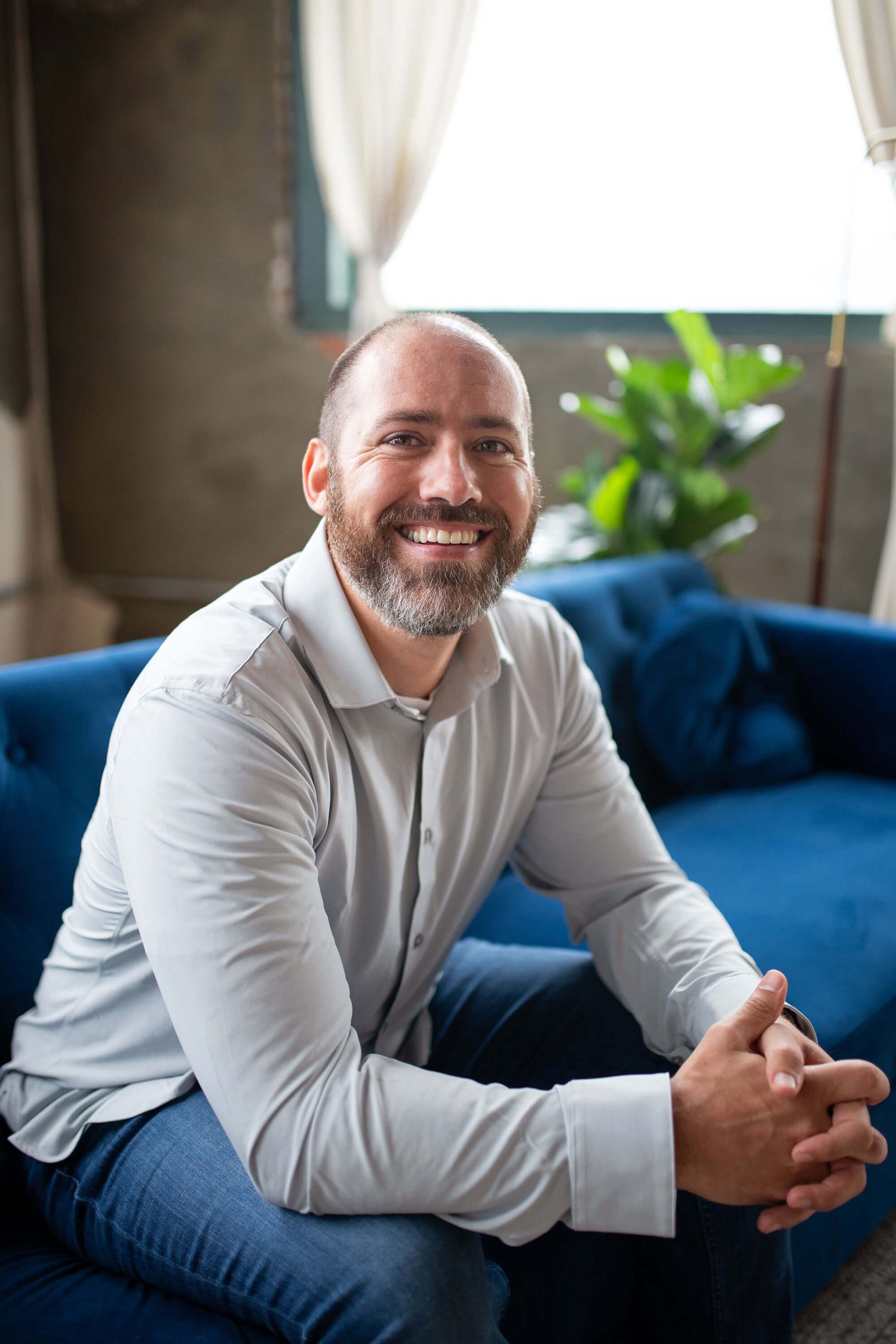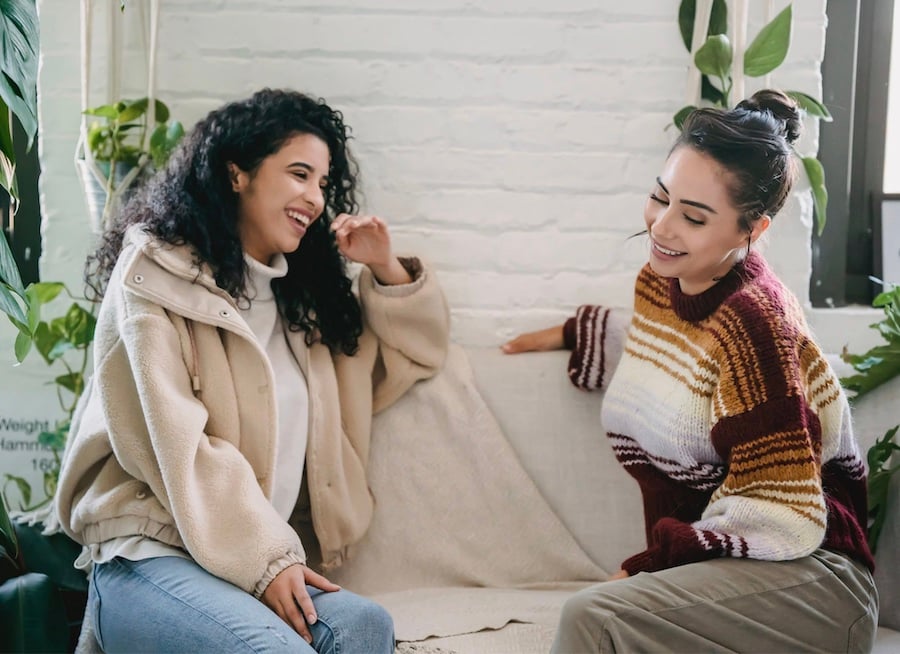How To Be A Good Friend
In this transcribed episode of the Shrink Think Podcast, Nathan and Aaron talk about what it means to be a good friend and share tips for improving your relationships.
Aaron Potratz:
Hey everyone, welcome again to The Shrink Think podcast. We are going to be talking today about Friendship. You know what, Nathan? You're a good friend.
Nathan Hawkins:
You're my friend Aaron.
Aaron Potratz:
And I said, you're a good friend.
Nathan Hawkins:
You're my friend.
Aaron Potratz:
Well, and you are a good friend too. Thank you. Not that I was fishing for that, not that I need things to be equal here, but it kind of raises a good question, which is actually the topic for the show today is like, well, how do you be a good friend? What does it even mean to be a good friend? I mean, it's kind of funny because we're just joking about it. Of course, being good friends means we can joke like that. We can tear each other down and we're like, ha, I know you, and then step on you. Yeah, right? That's not part of being a good friend. Don't tear each other down. But we do want to talk about some of the elements of being a good friend, because I think I would say overall, we want you guys out there to have good friendships, good relationships, and friendship is a part of that, right? And in order to have good friendships, you need to be a good friend. What's the best way to increase your friendships or have better friendships? Well, ask yourself, am I a good friend? Well, if you've answered that question here on the show and you're not quite sure, keep listening because by the end of the show, you will be a good friend results in our guarantee.
Nathan Hawkins:
But first, before we learn about being a friend to everyone else, you'll be a friend to Shrink Think podcast. You should go out and give us a five star review wherever you listen to this beautiful little podcast squad and find the five stars with your little mining podcast and get yourself a nice five stars and put them inside the review
Aaron Potratz:
And then tell everybody about us because we want to reach people, we want people to be happy and healthy. And of course, we want the reviews so that we have validation. We don't just cry at home alone by ourselves, well, together as friends. Yeah, that's right.
Aaron Potratz:
I cannot keep it together. Nathan, start us off. What are some ideas about being a good friend?
Nathan Hawkins:
Well, one thing is that friendship is obviously different than being a counselor. And I say that because in counseling we need to avoid advice at all costs pretty much. Or if you're going to give advice, you highlight it and say like, well, this is just going to be some advice, bro. But in friendship, it's not really like that. A lot of times the friends coming up for advice, but I would say you don't want to be an advice dispenser for a couple of reasons. One, because if you kind of are that person where maybe people lean on you that way because you're just a good thinker, you might not be that connected because if you're just kind of listening for what the problem is and then you're thinking, okay, yep, well there it is, isn't it? Okay, don't do that. I would say You need to do X, Y, Z.
Aaron Potratz:
Yeah, there's an element about that dynamic that is happening then in your relationship where it's going to sound bad. And I don't think any of you out there really intended this way, but I think functionally what ends up happening is you're kind of using each other or you're using someone. If you're a good thinker and you're problem solving, you're not really looking at each other necessarily as people to be in relationship with. You're looking at the other person maybe who's a good thinker or problem solver as someone who can help you solve a problem. That's kind of like a tool that might be a benefit of the person or the relationship. But primarily what you're talking about is we need to focus on the connection first. So what does that even mean? The connection?
Nathan Hawkins:
Yeah, and just being honest with you. I mean, that's something that I've had to work really hard on is it is hard to not want to just say, okay, do this. And the truth is that comes from a self-acceptance place at the end of the day. Because for me, what I was learning when I learned about that, I was kind of doing that automatically, just giving out advice even when people didn't necessarily need it, was that it had to do with there was a part of me that I didn't accept myself. My acceptance of myself was conditional. And so you need to be mindful of what it is that's going on.
Aaron Potratz:
And I would say on the other side, if I was in a relationship with you where that's happening, if I really genuinely care about you, then I don't necessarily need your advice. I mean, I might ask for it on something here or there, but if I'm in a relationship with you and if I want to be friends with you, I don't need advice from you in order to have a good time in order to be friends who you are as a person. We just have a good time together. It doesn't matter what you're saying. If it's helpful, not helpful, solves my problem. That's not why I'm in relationship with you. There might be times where I get that benefit, but most of the time I'm like, I just like Nathan. I just want to hang out, or I just want to have a good time, or whatever the case may be. So I think if there's something that happens, I think on the inside of you where if you can let go of needing to solve those problems, it's hard. I think if you can be aware of that. But if you can let go of that, then what you are freed up to then do is just to see and enjoy the other person for who they are.
Nathan Hawkins:
And that's the other side of this coin is that if the person's explaining something to you and you kind of have this idea heard, oh, well, there's your first problem and you haven't said anything, you've done a good job, you've kept your mouth shut, they're still talking. You are now not listening to the rest of what they're saying because thinking about like, oh, I can't wait to say this. This is going to be awesome. So the other side of that is you need to hear them all the way out because the reality is at the end of what they're saying, you may realize like, oh, they already understood all that. They actually already tried what I was going to tell them three times, and that's actually what their problem is. And so now I agree with them, I don't know what to do either, but you're with them, which is the whole point of friendship is really actually being together and being authentic.
Aaron Potratz:
And that's kind of getting at one of these things. If you break that down a little bit more, that if we're having this interaction where you're telling me something. And so I guess one of these points too that we're looking at is what do you need to do to be a good friend? You need to listen, make space for the other person to talk, but also make space inside yourself to hear and to understand what it is they're saying. So if you are telling me something, Nathan, and I'm immediately thinking, oh, well maybe you need to do this or you should try that, I've stopped making space for you inside myself, filled that space up with my own thoughts, my own ideas, instead of letting you fill that up. And that's part of, I think letting somebody be who they are. And I see this a lot of times as a therapist, and I'll make the parallel here.
Sometimes if I have the answer for somebody, I can just tell them, you need to do this, or This is what's going on. But that's not as valuable as them exploring it and coming to the conclusion themselves or me being on that journey with them and then them realizing, oh, I guess da. And we've arrived there together. So for example, what you just said, if you're telling me something and I'm like, oh, well that's really frustrating. What have you tried? Have you tried this? And you're like, yeah, I tried that. That didn't work. And then I tried this other thing and I'm thinking to myself, wow, it sounds like you've really been working at this. And I'm just kind of letting you go through that process and tell me those things rather than solving it for you. I can arrive at that same place alongside you and we can together say, wow, dude, it sounds like you've really worked at this. That must be really frustrating for you. I know we've been through that journey together. That's a really good experience, much more valuable than solving the problem most of the time. What friendship really is, is just going through those things together
Nathan Hawkins:
And that's listening to understand, so you actually are trying to understand what's going on and because you care. I mean, that's why you've become friends, you've clicked, you've hung out, and you're interested in some things. And here's the thing, the other point we wanted to make is that you want to be honest with yourself, which we've kind of talked about a little bit earlier and honest with the other person. So it may be that you're in a conversation, but you realize you're not doing a good job listening, and then you realize it's not because you don't care about the person. You've got your own stuff, your own crap. And this has happened with Aaron and I. Sometimes we go that we go to this local brewery, and a few weeks ago, it might even have been last week, I'm just kidding, I want it to be a few weeks ago.
I had just been through, it was just a hard week, and Aaron asked a question, and then I think I just went off for a while. I'm like, dude, I got to just dump. This just needs to get out because there was nothing else I could do until I got all this stuff out that had happened. And so if I would have just said like, no, that's fine. Go ahead talk Aaron. I wouldn't have any space for Aaron at that point. I was so filled up with crap. I had to get it out. But you have to be honest with yourself in order to do that. And that's one thing that I love about our friendship is we can do that. The space is there to be able to do it, and it's back and forth. It's an even Steven type of thing.
Aaron Potratz:
And I think that it takes a little bit of self-awareness too. Like you're saying, be honest with yourself, but I think it's also check in with yourself, pay attention to yourself, observe yourself. I think a lot of times people just are doing whatever they're doing and they're not even paying attention to what they are doing because they're so busy looking at what other people are doing and reacting. Whereas I think something that has been really valuable for us as therapists is we're constantly being watched and monitored by people, and then we're getting feedback. We're seeing reactions, and we're like, uh oh, what did my face just do? Or, uh oh, I just said something and that didn't go over well or whatever. But there's something really valuable about this of like, Hey, I realized I just said something and I could see you kind of stopped talking after that. Did I say something that upset you or whatever? Or in your case, you're like, you know what, Aaron? I've got lots of stuff that I need to dump out. I'm not going to be able to hear anything until I can dump this. It's like,
Nathan Hawkins:
Okay
Aaron Potratz:
Thanks for letting me know. Now I know kind of what's expected, what you need essentially, and I've got space. I can listen, and so you can dump, and that was a good thing and a positive experience for both of us instead of denying that reality and then just pretending like everything's okay, but then being stressed and dumping it on me anyway, and then I'm like, what the heck is going on? That would be us not being on the same page, not being honest with yourself
Nathan Hawkins:
And then it causes strain in the relationship for no reason. I mean, it's no reason at all has nothing to do with anything. Those are those weird conversations you end up in later. You realize that you should have just said something in the first place
Aaron Potratz:
Right? Dude, you seem kind of stressed. No, I'm not. Everything's fine. Just
Nathan Hawkins:
Tell me what you're going to say.
Aaron Potratz:
Yeah. Is it though, right?
Nathan Hawkins:
Doesn't seem fine.
Aaron Potratz:
Right? There's another piece of this too, as we're talking about listening, making space for the other person. One of the things that I hear from people all the time is like, man, I'm always the one to initiate things in the relationship, and I am kind of getting tired of that. I don't want to be the person that's always texting or calling or making plans, and the other person just sort of shows up. So part of being a good friend is initiating Yes, do that for sure, and if you're on the other side, if you're the person that's not doing that, man, you may not be actually as good a friend as you think you are, and maybe you've got a lot going on, that's totally fine, but you need to find a way to initiate or if the other person's initiating, at least respond. Don't just let their text hang there for several days. Respond to it. Take a moment. You have it.
Nathan Hawkins:
I know you have
Aaron Potratz:
A, people say all the time, I don't have any time. I'm like, yes, you do. I see the other things that you're scrolling Instagram, you're texting other people, whatever, you can stop and let your friends know you matter to me.
Nathan Hawkins:
Yeah. Chances are, if you're the last person who texted, you are not the initiator. If I'm thinking, am I thinking about that? Right?
Aaron Potratz:
Think it's backwards.
Nathan Hawkins:
That is backwards.
Aaron Potratz:
You're the last person, then you're waiting for the other person to respond
Nathan Hawkins:
Right? Right. That was nice and confusing. I don't even know what kind of friendship I'm having with myself or others.
Aaron Potratz:
It's called schizophrenia and Well, it sounds like you're good friends though. I see
Nathan Hawkins:
Green heads. Oh my goodness. Anyway, I think you're getting kind of the point that I'm trying to make as far as responding to people. I do hear Aaron was pointing out that initiation thing. I literally hear that all the time and to the point where it's funny, I started thinking one time everybody thinks they're initiating. I wonder how actually true it is, but I think it is true in the sense that probably the people, if you think that you're initiating a lot, you probably are initiating more than the other person, and maybe you should bring it up, just bring it up to the person and say, Hey, I care about you, and that's why I keep starting conversations. Are you just, maybe you're more busy than I thought. Do you need some time or space or maybe it's worth it. Trying to have that conversation
Aaron Potratz:
And that kind of leads into, I mean, this is a version of initiating, but something I think that is just really good for friendships for people to do, for us to do really as even the friend, is to take some time to actually think about your friends, first of all. Or if something comes up and you have thought about your friends or you're thinking about them, send them a message right away. I mean, I know we're talking a lot about texting, and we text quite a bit here, make a phone call, send a text. Whatever you need to do, send an email. The text is just a quick, easy thing, but the specific thing I want to encourage you to do is send a quick text saying, I'm thinking about you, so if somebody was going to have a surgery, or if you know somebody who's going through a difficult time, or even just if you haven't heard from the other person in a while, you can ask the question, Hey, how are you? That's a cool one because whenever I get that, it's like, wow, you are thinking of me awesome, and you want to know how I'm doing. There are no strings attached. It's not like you need something. It's like you just genuinely are trying to give me space to be heard. That's a cool, valuable friendship.
Nathan Hawkins:
Also, I think to do, especially if you haven't said anything to a person for a while, you have very random text. What'd you eat for breakfast? You haven't heard from him. They haven't heard from you in a couple, maybe a week or something. I think it'd be kind of a funny thing. What are you talking about? Get the thing started. Just kind of a funny thing to get it started. Your friend, they know that you're a freaking goofball. If that's you, that's not you.
Aaron Potratz:
Then you'll be a creeper and they're like,
Nathan Hawkins:
I’m
Aaron Potratz:
Blocking you. Right?
Nathan Hawkins:
I'm assuming that we're talking about actual friendship here and not random acquaintances. I'm thinking to people if I did that, they'd be like, well, I know that guy was kind of weird, but this is next level.
Aaron Potratz:
I thought we were friends. I thought I could ask what you had for breakfast and it would be normal.
Nathan Hawkins:
But it's not, and now it's creepy. That podcast sucks.
Aaron Potratz:
So one of the other things that you are getting from us too that we wrote down as some brief notes about this was what you get from our podcasts. It's not just that we're here to do a podcast and share content, but we are friends and what you get from us is that we laugh because we want to have a good time. We want to do this and do it well, but also we want to have a good time doing it because if we're not having a good time, then you guys are not having a good time, and there are lots of friendships out there where maybe that's not exactly everything that you guys do. Maybe you guys just have some deep conversations or whatever, but I think it's good for friendships to be able to have that balance where you can go deep, but you can also laugh and have a good time. Kind of like when you can do both. Then it makes more space, but when you can only do one, it's kind of like, oh, our friendship is this. It kind of pigeonholes you into something, sets the expectations and kind of puts a little bit of pressure on the relationship.
Nathan Hawkins:
One thing you can try actually to spice up the friendship is do the same thing you normally would do, but just do it in a different place. Maybe one of you picks, or maybe there's more than one, you pick a weird place that you normally would never go, so you're having the shared experience sitting in a different restaurant that maybe you never would eat at or some maybe a library or something. I'm just thinking out of the box so you can just have the different experience because friendship's just about connection and just being together, and the truth is with all that, you don't always have to be doing something, so just hanging out, doing nothing. I think the closest thing to that with doing something would be watching a movie. You're not going to be talking, right? You're just going to be sitting there watching a movie, but you're having kind of a shared experience. But yeah, just hanging out and being in the same spot is valuable because we like to do that as humans. We like to not be alone. We like to know that we're together and that the world is bigger than us.
Aaron Potratz:
And sometimes that works great for some friendships or some people, I mean, I guess I would challenge you if you're the kind of person where you're like, I need to be doing something like, okay. I mean that's valuable maybe sometimes, but I would want to challenge you to try to not do something, just to try to be, because I think you're saying there is something valuable about not just having a shared experience where we're intentionally doing something like, oh, we're skiing, and then we're swimming, and then we're making cookies, and then we're like, what if we're just doing normal things like go run errands with your friend. We're just running to target and I'm getting gas. We're just sort of hanging out. I've done that on the phone before and I've run errands with friends, and I'm like, it's cool because I don't really need to accomplish something in order to spend time with you. We can catch up while we're doing all of that, assuming you are okay with the comfort level with each other, but if you can get to that point, it's kind of cool because the point here then is it doesn't really matter what you're doing. You guys are just spending time together and that's a valuable friendship.
Nathan Hawkins:
That's a good idea actually. You're saying that. I'm like, I used to do that stuff. The Aaron's thing when I was in college, that was a pretty easy one to do. What do you got to do? Oh, I got to go to the bank and blah, blah. Oh, I got to go to the store. Can I just jump in your car, go with you? So then, yeah, now you're doing a couple things.
Aaron Potratz:
Why?
Nathan Hawkins:
The crap? Don't we just do that still for two adults or something?
Aaron Potratz:
I mean, I do that with my, I've got a buddy that he'll just call me like, oh, I'm on my way home, or He's got to run a couple of errands. Give me a call, and We'll, I'll just be on the phone. He's like, okay, hold on. Lemme call you back. I got to check out or something. It's like, okay, cool. Sometimes people will just sort of, I'll just hang on while they're checking out or vice versa, whatever. It's kind of funny too, because it's entertaining. You're talking about mixing things up in your friendship. I mean, what is more mixed up than we're running errands together and you got to interact with somebody and then they're out of stock of that, or like, oh, wait a minute. Do you want a bag with this? Or you're just joking with the person at the counter. It's kind of fun to hear those interactions because you don't hear those all the time from your friendships.
Nathan Hawkins:
Well, everyone, you've heard it here first. Aaron's cheating on me.
Aaron Potratz:
That's true.
Nathan Hawkins:
Other friends besides me
Aaron Potratz:
With the clerk at the counter, the bank teller with a lot of people. Nathan, yes, I do have other friendships besides you.
Nathan Hawkins:
Oh, no.
Aaron Potratz:
You're not as special as you think.
Nathan Hawkins:
You're, oh, man. Circles back to all my acceptance issues. Oh, man. Well, we hope that you will be a good friend to others and that you will also have good friends.
Aaron Potratz:
And ultimately deep down at the bottom of it, the very last thing I would say before we close up and you have a good day, I would say you need to make sure that you're there for people when something is going on. Don't overthink it. If something's going on, reach out. Ask for help or share, and if your friend is going through something, just what can I do? Ask the question or if there's something that is clear for you to do, jump up and just make space for it. Don't think about it. Just make space for it and then figure it out later on because ultimately that's just you prioritizing your friendships.
Nathan Hawkins:
Have a good day everybody.
Thanks for listening to our show. Don't forget to head over to Apple Podcasts, Spotify, Stitcher, or wherever you get your podcast to leave us a review and subscribe to our podcast so you never miss an episode. You can also sign up for our free email course, nine Ways to Overcome Fear and Self-Doubt. You'll get nine weeks worth of customized, practical strategies you can use to get past the fear that's holding you back in your life. Thanks again for listening.

Aaron
Aaron brings incredible passion, authenticity, and humor to all that he does - whether by providing care in his clinical practice or offering guidance in his consulting business. Aaron is a Licensed Professional Counselor and Clinical Supervisor in Oregon, the owner of Discover Counseling, and co-owner of Life Discovery Counseling Services. He maintains his own client caseload while managing his group practices and supervising his counseling staff. Aaron is also a private practice consultant and co-hosts the Shrink Think Podcast with Nathan Hawkins.




